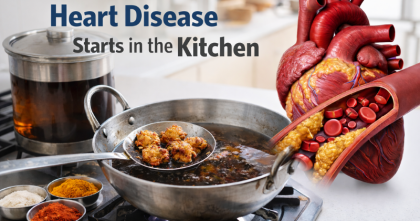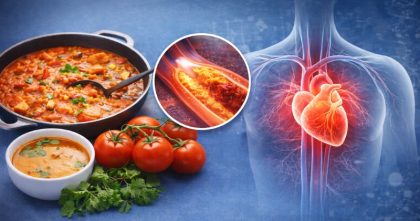Many South Asian families take pride in their vegetarian cooking traditions. We often hear that vegetarian food is healthier than meat-based dishes. But is this always true? Let’s talk about some cooking methods that might make our vegetarian foods less healthy for our hearts than we think.
The Hidden Heart Risks in Traditional Cooking
Deep-Fried Favorites
Pakoras, samosas, and bhajias are loved by everyone. They’re perfect for rainy days, special occasions, and family gatherings. But just because they contain vegetables doesn’t mean they’re heart-healthy.
Just like French fries aren’t health food, neither are veggie pakoras. When we deep-fry vegetables, they absorb large amounts of oil. A single piece of pakora can soak up half a teaspoon of oil [1]. This adds many calories and unhealthy fats to our diet.
Overcooking Vegetables Until Mushy
In many South Asian households, vegetables are cooked until very soft. Think of the common sabzi dishes where cauliflower, beans, or spinach are cooked until completely mushy.
When we overcook vegetables:
- They lose many vitamins and minerals
- Their fiber breaks down
- Their bright colors fade (along with their beneficial compounds)
As one dietitian explains, “Overcooking rids vegetables of their bright color and can strip them of nutrients” [2].
Reheated Curries with Extra Oil
Many families make large batches of curry and reheat them several times. Each time we reheat, we might add a little more oil or ghee to refresh the taste. This practice adds up—turning a moderately healthy dish into one that’s high in fat.
Also, reusing oil changes its structure, making it similar to unhealthy trans fats that can harm heart health [3].
Why Does This Matter for Our Hearts?
South Asians have higher rates of heart disease compared to other groups. In fact, studies show South Asians make up about 60% of the world’s heart disease patients [4].
Our traditional cooking methods might be part of the reason:
- High oil content increases bad cholesterol
- Loss of nutrients means we miss heart-protective benefits
- Lack of fiber affects how our bodies process fats and sugars
Simple Changes, Big Benefits
The good news? We don’t need to give up our beloved foods. Small changes in cooking methods can make a big difference to heart health while keeping all the flavors we love.
Instead of Deep Frying
Try baking or air-frying:
- Brush samosas with a little oil and bake them in the oven
- Use an air fryer for pakoras with just a spray of oil
- Make appe (small round snacks) in a special pan instead of deep-fried vadas
Meena Aunty from Delhi says: “I now bake my samosas instead of frying them. My grandchildren can’t even tell the difference, but my doctor is very happy with my cholesterol levels!”
Instead of Overcooking Vegetables
Try these methods:
- Steam vegetables until just tender but still bright in color
- Stir-fry quickly on high heat to preserve nutrients
- Add vegetables later in the cooking process so they stay crisp
Remember: Vegetables should have some bite to them—not be completely mushy.
For Healthy Curries
Try these approaches:
- Measure oil with a spoon rather than pouring freely
- Use non-stick pans to reduce oil needs
- Make smaller batches to avoid constant reheating
- Try water, vegetable broth, or yogurt to refresh curries instead of adding more oil
Family-Friendly Swaps to Try This Week
Here are some simple swaps you can start with:
| Instead of This | Try This |
| Deep-fried pakoras | Vegetable tikki baked in the oven |
| Mushy aloo gobi | Roasted cauliflower and potatoes with spices |
| Fried puris | Whole wheat rotis or naan |
| Heavy dal makhani | Dal tadka with measured oil |
| Reheated curry with extra oil | Fresh small-batch curries |
Adding Fiber: Nature’s Heart Protector
Fiber is very important for heart health. It helps control cholesterol and blood sugar. Many traditional South Asian cooking methods remove fiber by:
- Peeling vegetables
- Overcooking them until the fiber breaks down
- Straining out pulp or skins
Try these fiber-boosting tips:
- Keep vegetable skins on when safe (like potatoes)
- Add whole lentils or beans to dishes
- Include salads with your meals
- Try brown rice instead of white occasionally
Small Steps to Better Health
Remember, you don’t need to change everything at once. Start with one or two small changes:
- Try measuring oil with a spoon this week instead of pouring freely
- Slightly undercook one vegetable dish so it stays a bit crisp
- Experiment with one baked snack instead of fried
Raj Uncle from Mumbai shares: “I was skeptical when my daughter suggested baking our bhindi (okra) instead of frying it. But now I prefer it! It’s crispy, uses less oil, and my doctor says my heart is doing better.”
A Heart-Healthy Heritage
Our South Asian food traditions are precious and worth preserving. By making small adaptations to cooking methods, we can keep the flavors we love while protecting our hearts.
Remember, even traditional cooking deserves health awareness.
References
- [1] RecipeTin Eats. “Pakora (Indian Vegetable Fritters).” (2024).
- [2] Yahoo. “I love South Asian food, but it can be loaded with carbs and oil. Here’s how a dietitian would tweak my dishes without sacrificing the flavor.” (2022).
- [3] DESIblitz. “Top 10 Risks of the South Asian Diet.” (2016).
- [4] Business Insider. “I love my family’s South Asian food, but it can be loaded with carbs and oil. Here are 5 simple tweaks I made to balance my plate while keeping the flavor.” (2022).




